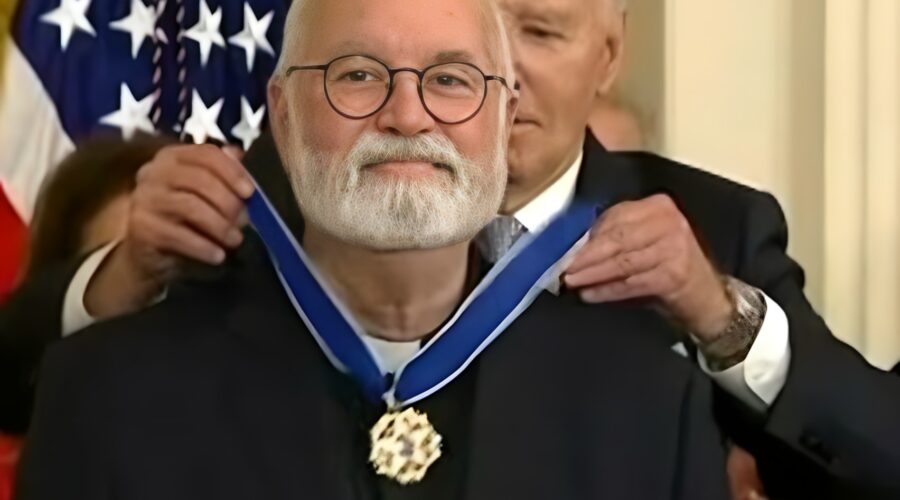Father Greg Boyle Honored with Presidential Medal of Freedom
Fr. Greg has come to a deeper truth: That personal transformation requires healing the scars that prevent people from realizing their unshakeable goodness, their nobility in God’s eyes. He believes in restorative justice — reconnecting people with their wholeness.
By DONALD E. MILLER
RELIGION UNPLUGGED
The founder of the largest gang intervention, rehabilitation and prison reentry program in the world is a mystic, a Jesuit priest who does not believe that God has a plan for your life. Having buried 260 young men and women, Father Greg Boyle rejects the idea that it is God’s plan that anyone should die of a gang member’s bullet.
I first met Fr. Greg 30 years ago when he was a lot skinnier and the priest at Dolores Mission in Boyle Heights, Los Angeles. This was a time when gang violence was at its peak, and the mothers of the neighborhood used to do peace vigils, walking the streets at night, petitioning their sons to put away their guns.
At that time, Fr. Greg thought the solution to gang violence was good employment, offering the motto that “Nothing stops a bullet like a job.” I visited one of the first social enterprises he started — a silk screening operation where members of different gangs were working side by side.
We reunited last year as part of a research project I’m conducting on exemplary humanitarians to understand the role of faith in motivating and sustaining their work. In the past 35 years, Homeboy Industries expanded into a $40 million a year organization, and Fr. Greg has become a bestselling author.
Sipping cappuccinos outside the Homeboy Bakery, I casually interacted with “homies” there for work, counseling, or a tattoo removal session. I was curious how Fr. Greg was perceived by the patrons. Was he the real deal or just a good storyteller in his books?
I found the homies come not only for the services, but also for the spirit and values that the priest has infused into the technically secular nonprofit.
While Fr. Greg still believes employment is important, as evidenced by the hundreds of former gang members and recently incarcerated people who work in Homeboy’s bakery, recycling program, and solar energy project, Fr. Greg has come to a deeper truth:
That personal transformation requires healing the scars that prevent people from realizing their unshakeable goodness, their nobility in God’s eyes. He believes in restorative justice — reconnecting people with their wholeness.
Being something of a skeptic, this what I find to be both exemplary — and unsettling — about Fr. Greg and the humanitarians I have had the privilege to get to know through my research: Their beliefs and practices allow them to develop a consciousness of ideal relations in which all beings are sacred, and hope and possibility exist regardless of the circumstances. They envision a world entirely different from our own and work to create it.
Whether working with gang members, caring for genocide survivors, stitching up the wounds of civil war, or giving hope and tangible assistance to impoverished people, modern-day saints like Fr. Greg challenge us and show us how to live with a deeply rooted sense of purpose.
My first attempt at a sit-down interview with Fr. Greg was aborted. Dozens of people were waiting their turns to meet with “G,” as the homies called him.
When I sat down opposite Fr. Greg’s desk and pulled out my tape recorder, explaining my intentions, I had barely gotten out my first question when Greg said, “Don, this is not going to work. We need a quiet place.” In the brief time I had been there, someone had already interrupted us with the need for a signature, and various homies kept waving to him as they passed by his glass-enclosed office.
On a typical day at Homeboy, Fr. Greg sees homie after homie. Listening to them. Hearing their challenges. Asking them about their goals. One time I sat by his desk for a while, and he was writing check after check, helping this person with rent, and another with groceries.
Homies melt into a bear hug, their face buried in his shoulder. He puts his hand on another homie’s shoulders, looking at him with a singular focus that makes them feel like they are the most important person in the world.
“Once I hit the office, I’m not going to be able to do anything,” he told me 10 days later, this time meeting in my house. “I’m not going to be able to do an email, check my cell phone.”
We sat for several hours as I probed him about things that were not in his books. To my surprise, he said that he gets up every morning “like a monk” at 2:45 a.m. When his feet hit the floor, he said: “I breathe in and out and make the sign of the cross while saying, ‘Through Him, and with Him … in the unity of the Holy Spirit … all glory and honor is yours, Almighty Father, forever and ever. Amen.’”
Then, after his first cup of coffee, he said that he does his “grounding walk,” slowly walking on the brick path that surrounds his house. Then he returns to his room, where he said that he has a corner with a little altar. He lights some candles, sets a timer, and then does what he calls his “breathing thing.”
Asked about this practice, he says that he can’t distinguish between meditation and prayer. Perhaps this reflects his reading of various mystics and interactions with Buddhists like Pema Chodron.
He says that he is a bit of a political junky, so while it is still early, he glances at The New York Times, the Los Angeles Times, Politico, The Huffington Post and Punchbowl News. He also checks email and interacts briefly with Sergio, a former gang member and his spiritual director, in an exchange of emails about the scripture of the day.
At exactly 7 a.m., he and Mark Torres, another Jesuit who lives in his house and works at Homeboy, iron their shirts together and check-in about various homies and their ups and downs. He then showers and heads to the office, often swinging by the bank since, as he says, “I’m the priest that the homies mistook for an ATM machine.”
At the end of the day, Greg does what he calls an “Ignatius thing” — the Examen or “discernment of spirits” — looking back on the day, reflecting on the highs (Consolation) and lows (Desolation), contemplating his response to different events and issues. He then falls into bed and tries to get six or seven hours of sleep before rising early the next morning.
Fr. Greg is no lone-ranger guru. His work at Homeboy Industries has a context. He is a Jesuit who went through a period of formation as a young priest and continues to operate out of the rich tradition of the Jesuits, including various practices initiated by the founder of the order, Ignatius.
Like most Jesuits, Fr. Greg lives in community. Every Sunday night, one of the five priests is responsible for dinner, and they eat together. This is a time of fellowship.
On Monday night at 7 p.m. they share the Eucharist and some readings, exchanging various lights or darkness they are experiencing, much like the members of a close-knit family might share the highlights and burdens of their lives. He and a few other Jesuits also go on annual 8-day retreats, where they practice silence during the day.
His community goes beyond the Jesuits as well. Fr. Greg has at least two other groups with which he meets on a regular basis.
On Tuesday nights — ever since COVID — he logs onto an hour-long Zoom call with 10-12 friends, mostly ex-gang members, including some of his “dearly deported” who live in Mexico or Central America, and they discuss a passage of scripture or a theological concept, such as compassion. The convener of this group is Sergio, his spiritual director, who leads a very free-flowing discussion in which almost everyone participates.
Then, once a month, Greg connects with a group of professors and friends for a one-hour spiritual salon. He is the only Jesuit, although the gathering includes a former Jesuit with a severely disabled daughter who lives with him in a L’Arche community in Portland, Oregon.
One of the first books they read together was the classic novel by Dostoevsky, The Brothers Karamazov, and now they are onto reading short stories. This discussion is more philosophical than the Tuesday night group, and they cover a variety of topics, including what they believe and no longer believe.
However traditional Fr. Greg may be in his practice as a Jesuit, he draws on the mystical tradition of Meister Eckhart, Teresa of Avila and others to embrace a non-dualistic view of God. Like Eckhart, he sees many characterizations of God as human projections. God is not judgmental; God does not get angry; God is not dependent on our love. God is not a string-puller who saves some people from car crashes but vengefully kills others. No, God loves us unconditionally.
The practice of Jesuits and many religious orders, both male and female, includes periodic 30-day silent retreats. Midway through his second 30-day silent retreat, 10 years after his ordination as a Jesuit priest, Fr. Greg says that he had a mystical experience that changed his understanding of God.
He felt his father coming behind him as he was sitting alone in the chapel, gently rubbing his neck as he used to do as a teenager while Greg was eating breakfast and reading the Los Angeles Times.
There was something enormously comforting, physical, and real about this experience, which was accompanied by an overwhelming realization of the love of God — that the essence of God is love.
Recalling this experience, Fr. Greg said he cried as he sat alone in this chapel, “as only one can after having been massaged into a newfound sense of sacred presence, deepened peace, and an unshakable holy assurance.”
One of the hallmarks of mystics is direct and unmediated experiences of God. According to the great American philosopher and psychologist William James, mystical experiences have a “noetic” quality that defy rational explanation. Yet they are often life-transforming. One has had an experiential glimpse of a reality that goes beyond theological dogma or institutional authority.
For Fr. Greg, this experience was liberating. In his books and public presentations, he often quotes Mirabai Starr, who says, “Once you know the God of love, you fire all the other gods.”
One needs to filter out all dualistic thinking about God — who God loves, rejects, punishes, and so on, Fr. Greg says. God does not have an evil twin, Satan. Such notions are human projections calculated to blame, separate, and demonize. God is love. God only sees our unshakeable goodness, our nobility, and seeks for us to wake up to our goodness—not “shape up” which is the moralizing view of God.
In Fr. Greg’s words, one needs to “smoke out what’s fear-based, what’s a museum piece, what God doesn’t give two toots about.”
Once you know the God of love, you filter things out, including magical thinking. Some biblical narratives need to be purified. The man Jesus healed was not possessed with demons; he had epilepsy. The wrathful God of the Old Testament reflects the human struggle to explain certain things.
Since Fr. Greg often quotes mystics from non-Christian traditions, I asked whether he has a pluralistic view of truth.
In response, he offered an analogy, saying that he likes a particular brand of single malt whiskey. He said, it’s not the bottle that is important, but what it contains. He was born into Catholicism; it is the tradition he knows, and it is the background of most of the homies with whom he interacts.
Therefore, he operates within that container and values it, saying mass on a regular basis; but he is unwilling to engage in dualistic thinking about other paths to truth, labeling them false or inadequate.
He quotes Teresa of Avila who says, “All concepts of God are like a jar we break.”
Next Week: Part 2
Donald E. Miller is the director of a global project on Engaged Spirituality at the University of Southern California’s Center for Religion and Civic Culture.
This story was originally published by Religion Unplugged. Reprinted with permission.
Photo
caption
Father Greg Boyle, the founder of Homeboy Industries, receives the Presidential Medal of Freedom, the country’s highest civilian award, from President Joe Biden.
—
Photo
caption
The scene of a multi-vehicle crash along the 21000 block of Pacific Coast Highway in Malibu, near Pepperdine University on Oct. 18, 2023. The crash killed four students from Pepperdine University and injured two others.
Screenshot via KeyNews.TV, Reuters





